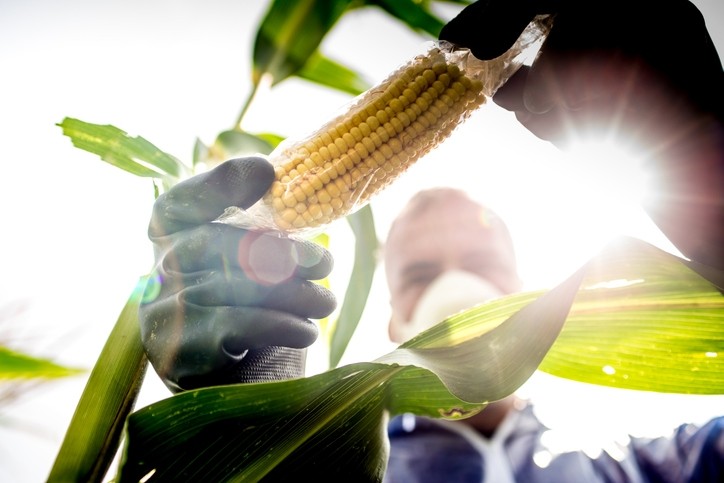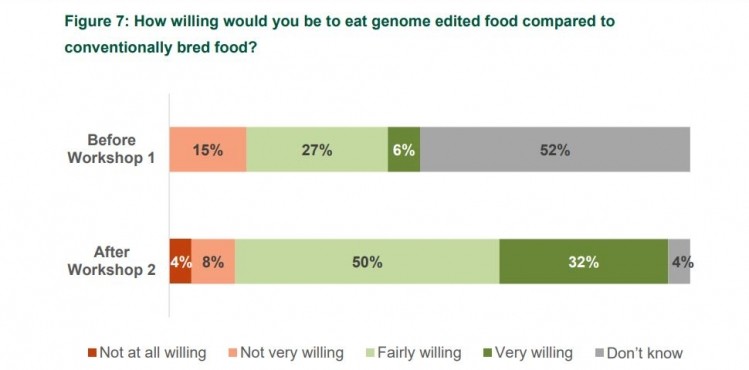UK government survey points to acceptance of GE foods among consumers

Genome editing, also known as gene editing, is one of a group of precision breeding techniques used to develop new varieties of plants and to introduce variation in animals.
Both gene editing (where DNA is tweaked in the genome of a living organism) and genetic modification (which includes the introduction of a new, foreign gene) are banned by the EU, at least for the moment.
Now that the UK has left the EU, genome editing in food may be an area of policy divergence and the British government says it intends to drive change in this area. Consequently, it has conducted research on consumer attitudes to help inform future food policy.
The research involved members of the public across England, Wales and Northern Ireland in online workshops, followed by a representative survey of over 2,000 consumers.
Consumers tended to have low awareness and very low knowledge of genome edited food. Most had not heard of genome edited food or confused it with GM food.
Workshop participants were given a presentation which included introducing DNA, an explanation of what a genome is, and a timeline of genetic discoveries. This emphasised that artificial selection and selective breeding of livestock and crops has been done for thousands of years but that GM and genome editing techniques were more recent. Information was provided on the range of individuals and organisations involved, and the differences between artificial selection and induced mutation, genome editing and genetic modification. Participants were then shown a video about genome editing and the CRISPR-Cas9 technique.
The pre- and post-workshop surveys also asked participants how willing they would be to eat genome edited foods compared to conventionally bred food and compared to GM foods. Their responses before the workshops and after the workshops showed a similar pattern around the level of concern. In the pre-workshop survey, there were far more participants answering ‘don’t know’ than in the post-workshop survey. During the workshops, willingness to eat genome edited foods increased, with 82% saying they would be ‘fairly’ or ‘very’ willing to eat genome edited food compared to conventionally bred food after the workshops compared to 33% before the workshops.
After the workshops, 74% said that they would be ‘fairly’ or ‘very’ willing to eat genome edited food compared to GM food, compared to 30% before the workshops. While the overall number of participants indicating that they were not willing to eat genome edited foods did not change much over the course of the workshops, there seemed to be an increase in strength of feeling among this group with some people answering ‘not at all willing’ after the workshops.
Consumers tended to find GE food more acceptable than GM food, the survey revealed. However, consumers found GM or GE applied to plants more acceptable than applications to animals, for example, due to human safety and animal welfare concerns.
Most consumers, meanwhile, felt it would be appropriate to regulate GE foods separately from GM foods. At the same time, many felt regulation should be just as thorough as for GM.
Most consumers felt labelling should always inform the consumer of the presence of GE ingredients using the full term ‘genome edited’.
Overall, consumers wanted thorough regulation and transparent labelling if GE foods reach the UK market, and they suggested social media information campaigns and TV documentaries would help educate the public on GE food.
Professor Robin May, FSA Chief Scientific Adviser, said: “We welcome the findings of this important consumer research project, which will help the FSA as we continue to build an evidence base to inform future food policy, safety advice and labelling requirements in this fast-moving area.
“Our priority is to represent and protect the consumer, and so it is vital that we continue to work closely with the public, as well as embarking on other cutting-edge research initiatives, to ensure we use the most robust evidence in order to act in consumers’ interests.
“The UK prides itself on having the very highest standards of food safety, and there are strict controls on GM crops, seeds and food which we at the FSA will continue to apply moving forward. We will continue to work closely with a wide range of partners to develop our future regulatory approach in this area in response to these views and the forthcoming publication of findings from the consultation led by Defra.”






















